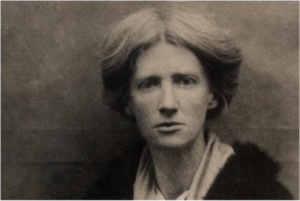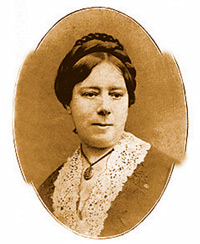Today in Lent Madness, it's the last matchup of the Saintly Sixteen as Eglantyne Jebb squares off against Catherine Winkworth in the Lent Dome. To get to this round Eglantyne routed Seraphim of Sarov while Catherine upset Isaac Watts.
If you had a big weekend and/or your memory is shaky, on Friday Martin de Porres defeated Dymphna 62% to 38% to advance to the Elate Eight where she'll face Maria Skobtsova.
Tomorrow we begin the Elate Eight, aka the Round of Saintly Kitsch as Peter faces Esther. Hold on to your Bibles, folks!
Eglantyne Jebb
 Charismatic British social reformer. Fierce human rights advocate. Brilliant organizer. Savvy political activist. Generous philanthropist. These are just a few ways one might describe Eglantyne Jebb, the founder of Save the Children, the international organization that promotes children's rights and supports them in developing countries around the globe.
Charismatic British social reformer. Fierce human rights advocate. Brilliant organizer. Savvy political activist. Generous philanthropist. These are just a few ways one might describe Eglantyne Jebb, the founder of Save the Children, the international organization that promotes children's rights and supports them in developing countries around the globe.
This being the round of quirks and quotes, it's worth noting that Eglantyne Jebb was a QUOTE MACHINE. Here are a few of her most memorable ones:
Save the Children is often told that its aims are impossible – that there has always been child suffering and there always will be. We know. It’s impossible only if we make it so. It’s impossible only if we refuse to attempt it.
The only international language in the world is a child's cry.
Relief work does not consist entirely in wearisome appeals ... it has its moments of enchantment, its adventures, its unexpected vistas into new worlds.
We'll end with a story that shows Jebb's power -- of persuasion, of persistence, and of passion. After receiving front-page coverage for her arrest protesting the Allied blockade's impact on children following World War I, Eglantyne was savvy enough to know that publicity alone would not feed the starving children of Europe. Determined to capitalize on her newfound celebrity, Jebb decided to hold a public meeting to garner further support for her cause. Being an optimist, she booked the biggest venue in London: the Royal Albert Hall. News reports say it was standing room only.
Unfortunately, it soon became clear that the crowd was not entirely there to support her. Many arrived with rotten fruit and vegetables to throw at this ‘traitor’ who sought to support 'the enemy'. After a hesitant start, Jebb's voice rose in conviction and strength until she cried out, ‘Surely it is impossible for us, as normal human beings, to watch children starve to death without making an effort to save them’. In the stunned silence that followed, a collection was spontaneously taken up.
Catherine Winkworth
 If you could have dinner with a group of people in history, who would it be? Does your mind race to Paris, where Gertrude Stein held parties with Ernest Hemingway and F. Scott Fitzgerald? Or do you gravitate to New York for the Harlem Renaissance after the Great African-American migration? Do you imagine spending time with Langston Hughes and Zora Neale Hurston while listening to Duke Ellington? Or could your answer center around Catherine Winkworth and her friends?
If you could have dinner with a group of people in history, who would it be? Does your mind race to Paris, where Gertrude Stein held parties with Ernest Hemingway and F. Scott Fitzgerald? Or do you gravitate to New York for the Harlem Renaissance after the Great African-American migration? Do you imagine spending time with Langston Hughes and Zora Neale Hurston while listening to Duke Ellington? Or could your answer center around Catherine Winkworth and her friends?
Throughout history, we have seen genius constellations gather—people who seem drawn to one another’s brilliance, whose art stands out in proximity to the shining light of another. Winkworth was one of those bright stars as she gathered among women whose talents shed light on the social ills of their day and whose generosity worked for system change.
Winkworth had a way with words, as she translated many of our finest hymns from German, perhaps this is why she also connected with extraordinary novelists, poets, and musicians. Winkworth seemed especially drawn to proto-feminists who combined social commentary with Christian morality. They were artists who struggled on behalf of education for women, the abolition of slavery, and rights for children. They exposed the classism and brutality of the industrial revolution, and they understood how to utilize the power of words and music in order to create a more generous society.
If we looked around at Winkworth’s imaginary dinner table, we would find Elizabeth Gaskell. Gaskell and Winkworth spent time together as children, before Winkworth’s mother died and she had to move. In the years to follow, Gaskell wrote many books including North and South, which has been called Pride and Prejudice for socialists.
Beside Gaskell, we could find Charlotte Brontë, the eldest of the Brontë sisters and the author of Jane Eyre. Through strong female characters, Brontë explored religion and classism.
At the next place setting, we might find Elizabeth Barrett Browning. We know that as Winkworth got older, she began to correspond with Elizabeth Browning, the poet who fought child labor and worked for the abolition of slavery.
In our dinner party fantasy, we could also find Jenny Lind, the “Swedish Nightingale.” This extraordinary diva corresponded with Winkworth when she was not touring. Lind did not use her beautiful voice to line her own pockets, but Lind raised money for favorite charities, including schools and churches.
It’s no wonder that so many brilliant minds gravitated toward Winkworth, as she used her own talents in translation, poetry and music, Winkworth also worked for the education of girls and women. Their art and passions would make them excellent dinner party companions.
[poll id="228"]
117 comments on “Eglantyne Jebb vs. Catherine Winkworth”
I'll dine with Catherine but take up a collection among all those illustrious guests for Eglantyne's cause. Vote Jebb!
I thought Martin de Porres was a guy
Today is International Dudes Honoring Women's Achievements by using Feminine Pronouns day.
I also thought Martin was a man. Never knew a female Martin. Voted for Catherine, but not really with any enthusiasm.
Maybe the writer of today's introduction was subconsciously wishing that Dymphna had beat Martin whilst writing the introduction.
Would a vote for Catherine be a vote to salvage the reputation of Jenny Lind, after “The Greatest Showman on Earth” turned her into a bimbo?
Hello? Hello? No one's seen "Greatest Showman"?
Eglantyne could be the current-day Saint for Child Victims of Gun Violence.
No deliberation needed today - Eglantyne all the way: That passion, that eloquence, that daring - saintly qualities indeed, especially now. Posted in honor of the young leaders of the March for Our Lives. God bless and protect them.
Today it's 6 of one and 1/2 dozen of another and a hard choice but, in the end, I voted for Catherine based on "eeny, Meeny Miny Moe"....I know, I know...not too cool.
At least it wasn't because she's the "underdog". Thank you for that.
I have to admit that I don't like "Save The Children" commercials. I would rather be in the company of strong women.
Must agree with you about those commercials.
Go Richard Hooker
Given today's Eglantyne Love Fest, Richard's gonna need it.
Winkworth is a personal role model but Eglantyne is the obvious victor. sylvester
Filling Royal Albert Hall -- amazing!
I do appreciate Catherine but went with Eglantyne this time. Found a story about her that I love. Apparently she asked the Archbishop of Canterbury to support her work, but he was hesitant. So she went to the Pope instead, and he was enthusiastic about it. Seeing that, Canterbury came on board. 🙂 Nothing wrong with a little ecumenical arm-twisting for charity!